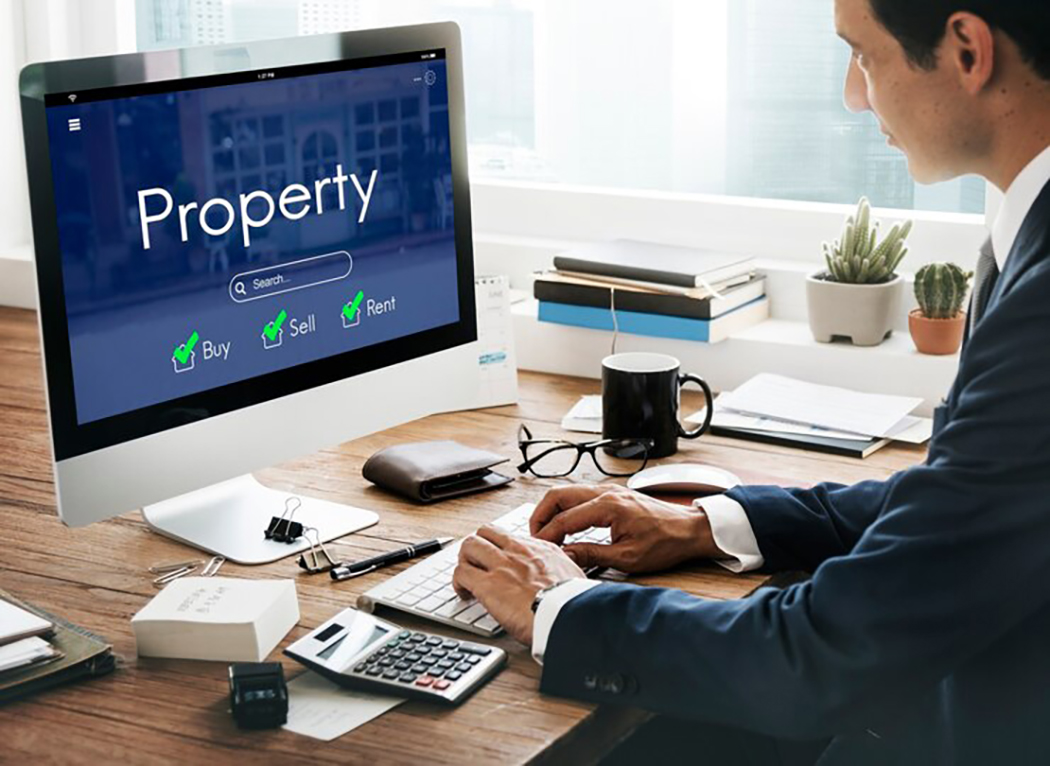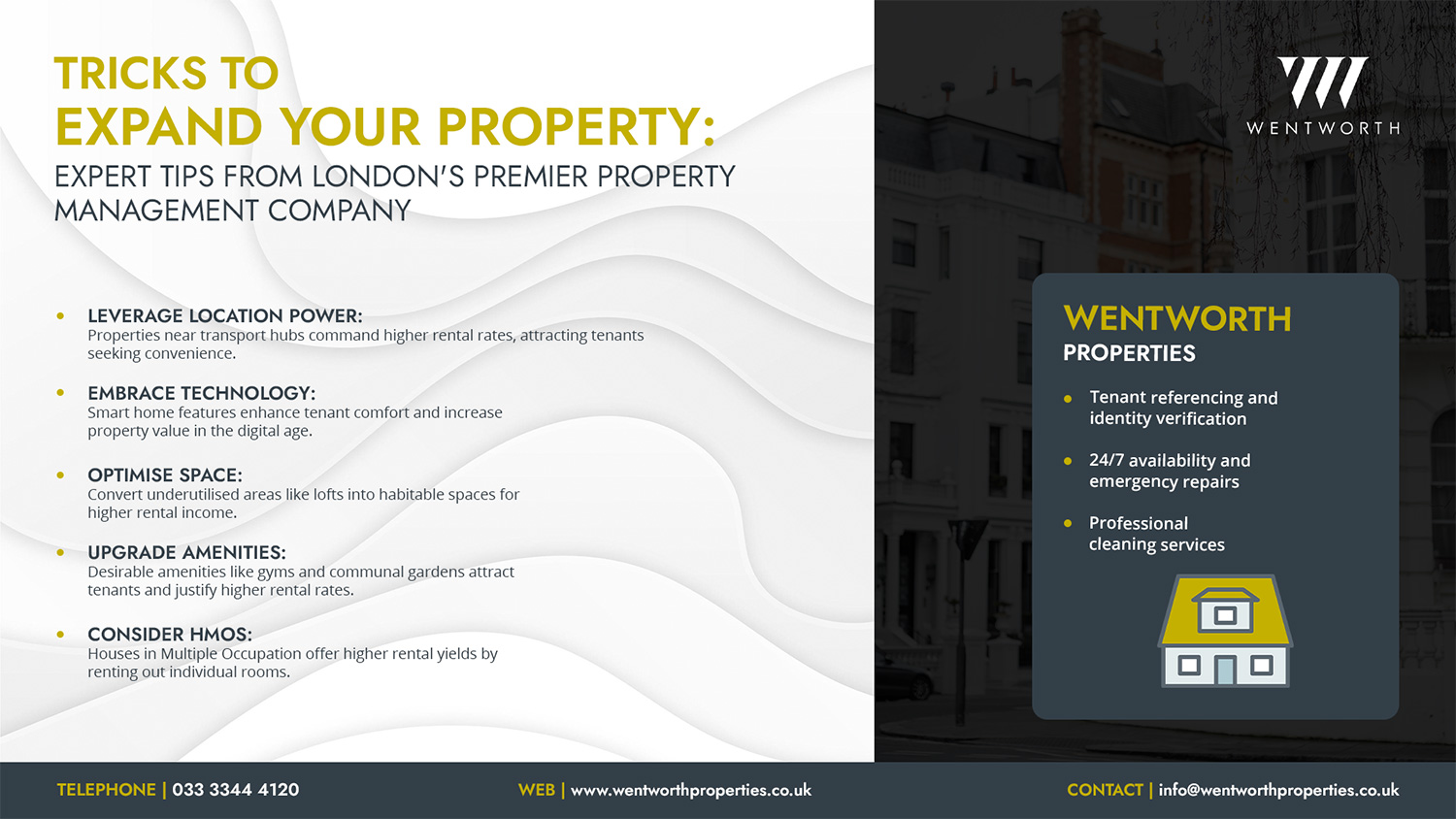
10 Tricks to Expand Your Property: Expert Tips from London's Premier Property Management Company
Expanding a property portfolio is a significant goal for landlords aiming for long-term success in the competitive real estate market. Whether you’re a seasoned investor or just starting out, strategic insights can make a substantial difference in maximising rental income and property value. In this article, as London’s premier property management company, Wentworth Properties will delve into each of the ten expert tips, offering detailed explanations and actionable advice backed by relevant statistics and official sources.

Leverage the Power of Location
The rationale behind this is straightforward: convenient access to public transport enhances the desirability of a property, making it more appealing to potential tenants. Commuters, in particular, value properties located near transportation hubs due to the convenience it offers in terms of commuting to work, school, or leisure activities. As a landlord, prioritising properties with strategic locations can lead to higher demand, lower vacancy rates, and ultimately, greater profitability.
When considering the power of location, it’s essential to evaluate various factors beyond just transportation access. Proximity to amenities such as schools, shopping centres, parks, and employment hubs also plays a significant role in determining a property’s attractiveness to tenants. Conducting thorough market research and understanding the demographic profile of prospective tenants can help landlords identify prime locations that align with their investment objectives.
Embrace Technology
In today’s digitally-driven world, technology has become an integral part of everyday life, including the way people interact with their living spaces. Research indicates that a vast majority of tenants prefer properties equipped with smart home features. These features encompass a range of technological advancements, including automated heating systems, smart security devices, energy-efficient appliances, and remote-controlled amenities.
The appeal of smart home technology lies in its ability to enhance convenience, comfort, and security for tenants. Automated heating systems, for instance, allow tenants to regulate indoor temperatures remotely, optimising energy usage and reducing utility costs. Similarly, smart security systems offer peace of mind by providing real-time monitoring and alerts for potential security breaches.
From a landlord’s perspective, investing in smart home technology not only increases the attractiveness of a property but also enhances its market value. Properties equipped with modern amenities are perceived as more desirable by tenants, allowing landlords to command higher rental rates and achieve greater tenant retention. Additionally, smart home features can contribute to long-term cost savings through improved energy efficiency and reduced maintenance expenses.
Optimise Space
Maximising the utility of available space is essential for landlords looking to expand their property portfolio and increase rental income. One effective strategy for achieving this is by converting underutilised spaces, such as lofts or basements, into habitable living areas. Statistics indicate that such conversions can result in a substantial increase in rental income.
The key advantage of space optimisation is its ability to unlock hidden value within a property without the need for extensive structural modifications. Loft conversions, for example, offer an opportunity to create additional bedrooms, home offices, or recreational areas, thereby increasing the property’s appeal to a wider range of tenants. Similarly, transforming a basement into a self-contained apartment or entertainment space can significantly enhance the property’s rental potential.
When considering space optimisation, landlords should carefully assess the feasibility and cost-effectiveness of various conversion options. Factors such as local planning regulations, construction costs, and potential rental yields should be taken into account to ensure that the investment aligns with long-term profitability goals. Additionally, landlords should prioritise enhancements that add tangible value to the property and cater to the evolving needs of modern tenants.
Upgrade Amenities
In today’s competitive rental market, amenities play a crucial role in attracting tenants and differentiating a property from its peers. Properties offering desirable amenities, such as gyms, communal gardens, and concierge services, can command higher rental rates and enjoy greater tenant satisfaction.
The appeal of amenities lies in their ability to enhance the overall living experience for tenants. A well-equipped gym, for instance, offers residents the convenience of on-site fitness facilities, eliminating the need for expensive gym memberships or travel to external fitness centers. Similarly, communal gardens provide a tranquil outdoor space for relaxation and socialisation, fostering a sense of community among residents.
When upgrading amenities, landlords should prioritise investments that align with the preferences and lifestyles of their target demographic. Conducting market research and soliciting feedback from existing tenants can help identify amenities that add the most value and appeal to prospective renters. Additionally, landlords should consider the operational and maintenance costs associated with amenities to ensure long-term sustainability and profitability.

Consider HMOs (Houses in Multiple Occupation)
Houses in Multiple Occupation (HMOs) represent a lucrative opportunity for landlords seeking higher rental yields and diversification within their property portfolio. HMOs are properties rented out to multiple tenants who are not part of the same household, typically on a room-by-room basis.
The attractiveness of HMOs lies in their ability to maximise rental income by leveraging economies of scale. By renting out individual rooms within a property, landlords can achieve higher overall rental yields compared to renting the property as a single unit. Additionally, HMOs offer greater flexibility in terms of tenant demographics, allowing landlords to cater to various market segments, such as students, young professionals, or key workers.
However, it’s important for landlords to be aware of the regulatory requirements and management considerations associated with HMOs. In many jurisdictions, HMOs are subject to specific licencing and regulatory standards aimed at ensuring the safety and well-being of occupants. Landlords should familiarise themselves with these regulations and ensure compliance to avoid potential legal issues or penalties.
Professional Property Management
Outsourcing property management to professionals can streamline operations, reduce administrative burdens, and enhance overall efficiency for landlords. Properties managed by experts experience significantly fewer void periods, resulting in sustained cash flow and improved profitability. Professional property managers handle a wide range of tasks, including tenant acquisition, rent collection, maintenance, repairs, and legal compliance, allowing landlords to focus on strategic growth and expansion initiatives.
The benefits of professional property management extend beyond mere operational efficiency. Experienced property managers possess in-depth knowledge of local market dynamics, enabling them to optimise rental strategies, mitigate risks, and capitalise on emerging opportunities. Additionally, property managers serve as a point of contact for tenants, addressing inquiries, resolving disputes, and ensuring a positive rental experience for all parties involved.
When selecting a property management company, landlords should prioritise firms with a proven track record of success, relevant industry certifications, and strong references from satisfied clients. It’s essential to establish clear communication channels and expectations upfront to ensure alignment on key objectives and performance metrics. By partnering with a reputable property management company, landlords can enhance the value proposition of their properties and achieve long-term success in the competitive real estate market.
Add Value through Renovations
Renovations represent an effective strategy for increasing property value, attracting high-quality tenants, and maximising rental income. A well-executed renovation can enhance the aesthetic appeal, functionality, and marketability of a property, resulting in higher rental rates and improved tenant satisfaction.
When planning renovations, landlords should focus on enhancements that offer the greatest impact and return on investment. Target areas such as kitchens, bathrooms, and common areas, which are highly influential in shaping tenants’ perceptions of a property. Upgrading fixtures, appliances, flooring, and finishes can create a more modern, inviting living environment that appeals to discerning renters.
In addition to cosmetic improvements, landlords should also consider upgrades that contribute to energy efficiency, sustainability, and overall property performance. Installing energy-efficient appliances, upgrading insulation, and implementing water-saving fixtures not only reduce operating costs but also align with evolving tenant preferences for eco-friendly living spaces. By prioritising renovations that add tangible value and improve tenant satisfaction, landlords can enhance the long-term viability and profitability of their properties.
Diversify Your Portfolio
Diversification is a fundamental principle of investment management that applies equally to real estate portfolios. By spreading investments across different property types, geographic locations, and market segments, landlords can reduce risk exposure, enhance portfolio stability, and capitalise on diverse income streams. Diversification also provides opportunities for strategic optimisation and growth, allowing landlords to adapt to changing market conditions and investor preferences.
Residential properties, including single-family homes, apartments, and condominiums, represent the foundation of many real estate portfolios. These properties offer stable rental income, long-term appreciation potential, and broad market appeal. Commercial properties, such as office buildings, retail centres, and industrial warehouses, provide additional diversification benefits through exposure to different economic sectors and tenant industries.
Mixed-use properties, which combine residential, commercial, and retail components within a single development, offer unique opportunities for synergies and value creation. By leveraging complementary uses and shared amenities, mixed-use properties can attract a diverse tenant base and enhance overall property performance. Additionally, mixed-use developments contribute to vibrant, walkable communities, fostering social interaction and economic vitality.
When diversifying a property portfolio, landlords should consider factors such as market dynamics, investment objectives, risk tolerance, and portfolio size. It’s important to conduct thorough due diligence and seek professional guidance to identify suitable investment opportunities and mitigate potential risks. By diversifying strategically and maintaining a balanced portfolio, landlords can optimise returns and achieve long-term financial success in the real estate market.
Long-Term Leases
Offering long-term leases provides stability and predictability for both landlords and tenants, reducing turnover costs and minimising vacancy risks. Statistics show that long-term leases, typically defined as leases with durations of three years or more, contribute to sustained cash flow and enhanced property value over time. By incentivizing tenants to commit to longer lease terms, landlords can foster tenant loyalty, reduce administrative overhead, and maintain consistent rental income streams.
Long-term leases offer several benefits for landlords, including reduced leasing-related expenses such as marketing, tenant screening, and turnover costs. Additionally, long-term leases provide landlords with greater financial visibility and planning certainty, facilitating more effective budgeting and investment decision-making. For tenants, long-term leases offer stability and peace of mind, allowing them to establish roots and integrate into the community without the uncertainty of frequent relocations.
To encourage long-term lease commitments, landlords can offer incentives such as rent discounts, lease renewal options, or maintenance service agreements. By demonstrating value and flexibility to tenants, landlords can strengthen tenant relationships and minimise turnover rates, ultimately enhancing the overall profitability and stability of their property portfolio.
Stay Informed
Staying informed about market trends, regulatory changes, and industry developments is essential for landlords seeking to maximise returns and navigate the complexities of the real estate market. Research shows that landlords who stay informed about market trends achieve better returns and are better equipped to make informed decisions regarding property acquisitions, rental pricing, and portfolio management strategies.
To stay informed, landlords should actively monitor key indicators such as rental vacancy rates, property prices, rental demand, and demographic trends. Additionally, landlords should stay abreast of legislative changes, zoning regulations, and tax policies that may impact property ownership and management practices. Attending industry seminars, networking events, and professional conferences can provide valuable insights and opportunities for knowledge exchange with peers and industry experts.

Conclusion
Expanding a property portfolio requires careful planning, strategic execution, and ongoing adaptation to market dynamics. By implementing the ten expert tips unveiled by London’s premier property management company, landlords can position themselves for long-term success and watch their property empire grow. Whether leveraging the power of location, embracing technology, optimising space, or diversifying portfolios, these tricks offer actionable strategies for maximising rental income, enhancing property value, and achieving sustainable growth in the competitive real estate market. Remember, knowledge is the key to unlocking the full potential of your property investments, so stay informed and proactive in your approach to property management and investment.
Are you looking to get services for the best property management companies in London as a landlord? Visit us at Wentworth Properties.
Ready to Expand Your Property Portfolio?
- Contact Wentworth Properties for expert property management services in London.
- Let us help you optimise rental income and enhance property value.
- Take the next step towards long-term success in the real estate market
FAQ:
Location plays a crucial role in property investment as it directly impacts rental rates, demand, and property value. Properties situated near transport hubs, amenities, and employment centres tend to attract more tenants, resulting in higher occupancy rates and rental income.
Integrating smart home technology into your rental property can enhance tenant experience, improve property security, and increase marketability. Automated heating systems, smart locks, and energy-efficient appliances not only attract tenants but also contribute to long-term cost savings and property value appreciation.
Optimising space in rental properties allows landlords to maximise rental income without significant structural changes. Converting underutilised spaces like lofts or basements into habitable areas can increase the property’s appeal to a wider range of tenants and justify higher rental rates.
Desirable amenities such as gyms, communal gardens, and concierge services enhance the overall living experience for tenants and differentiate a property from competitors. Properties offering quality amenities not only attract tenants but also justify premium rental rates, leading to higher profitability for landlords.
HMOs are properties rented out to multiple tenants who are not part of the same household, typically on a room-by-room basis. HMOs offer landlords higher rental yields by leveraging economies of scale and catering to diverse tenant demographics. However, landlords should be aware of regulatory requirements and management considerations associated with HMOs.



